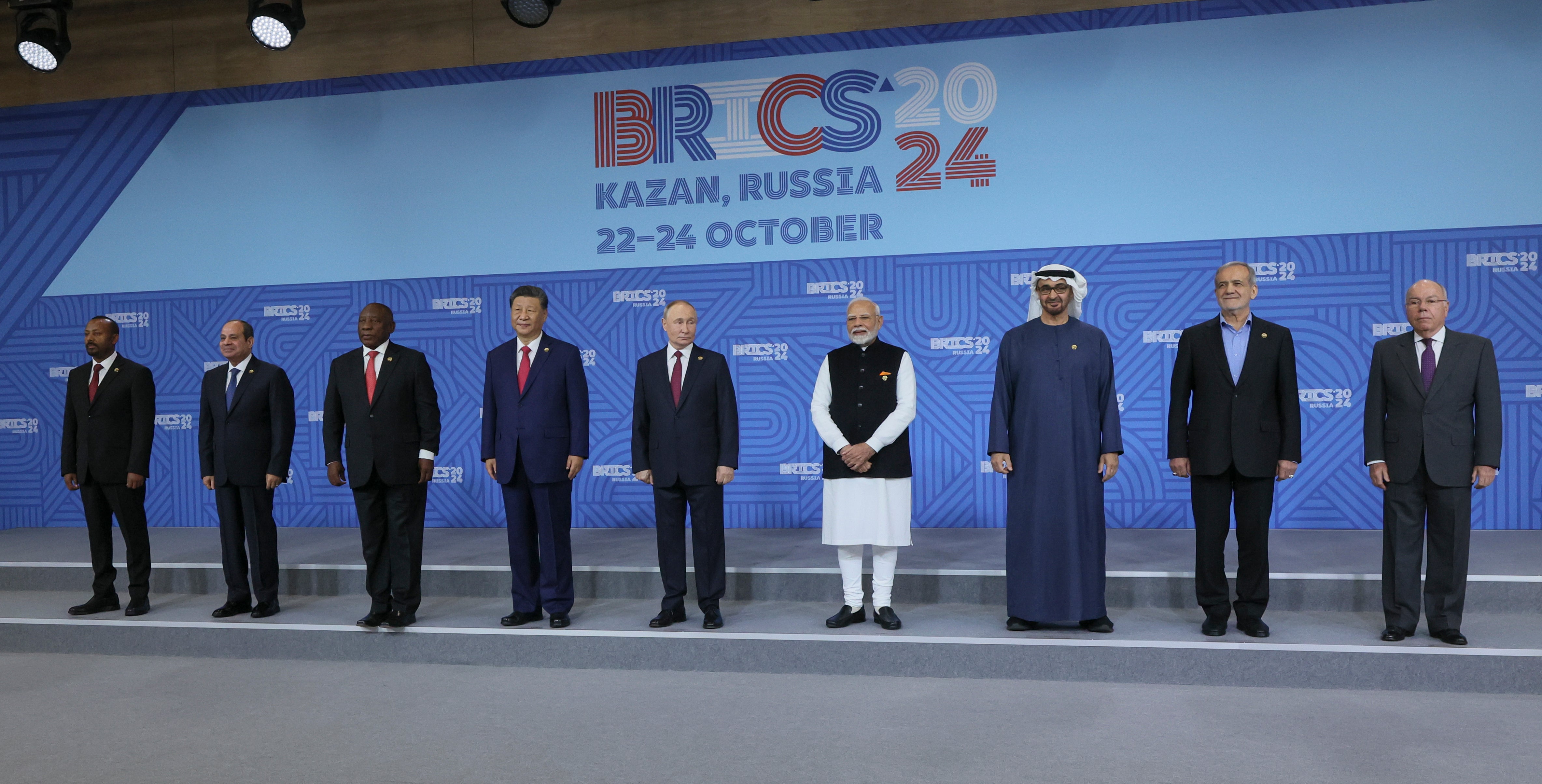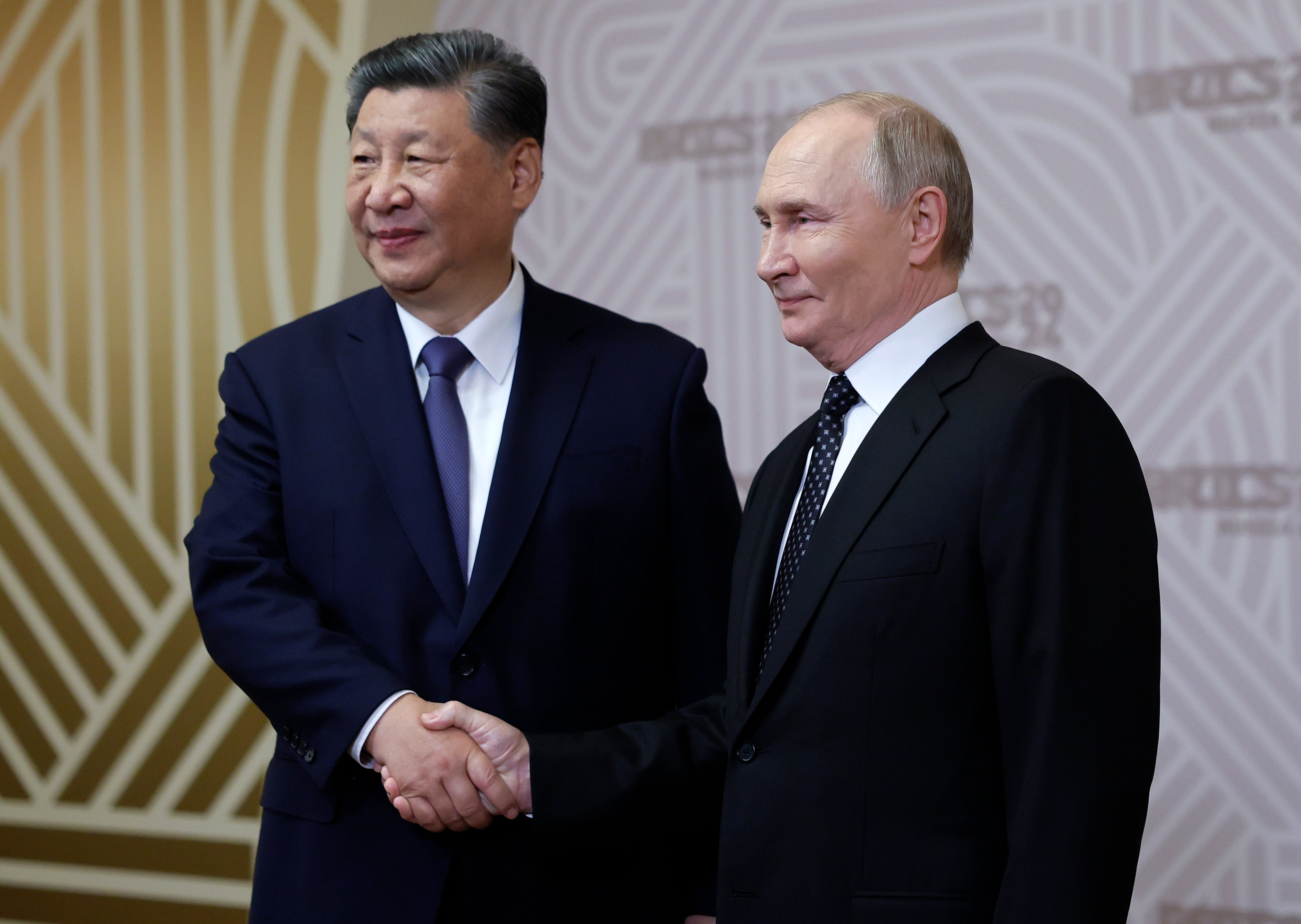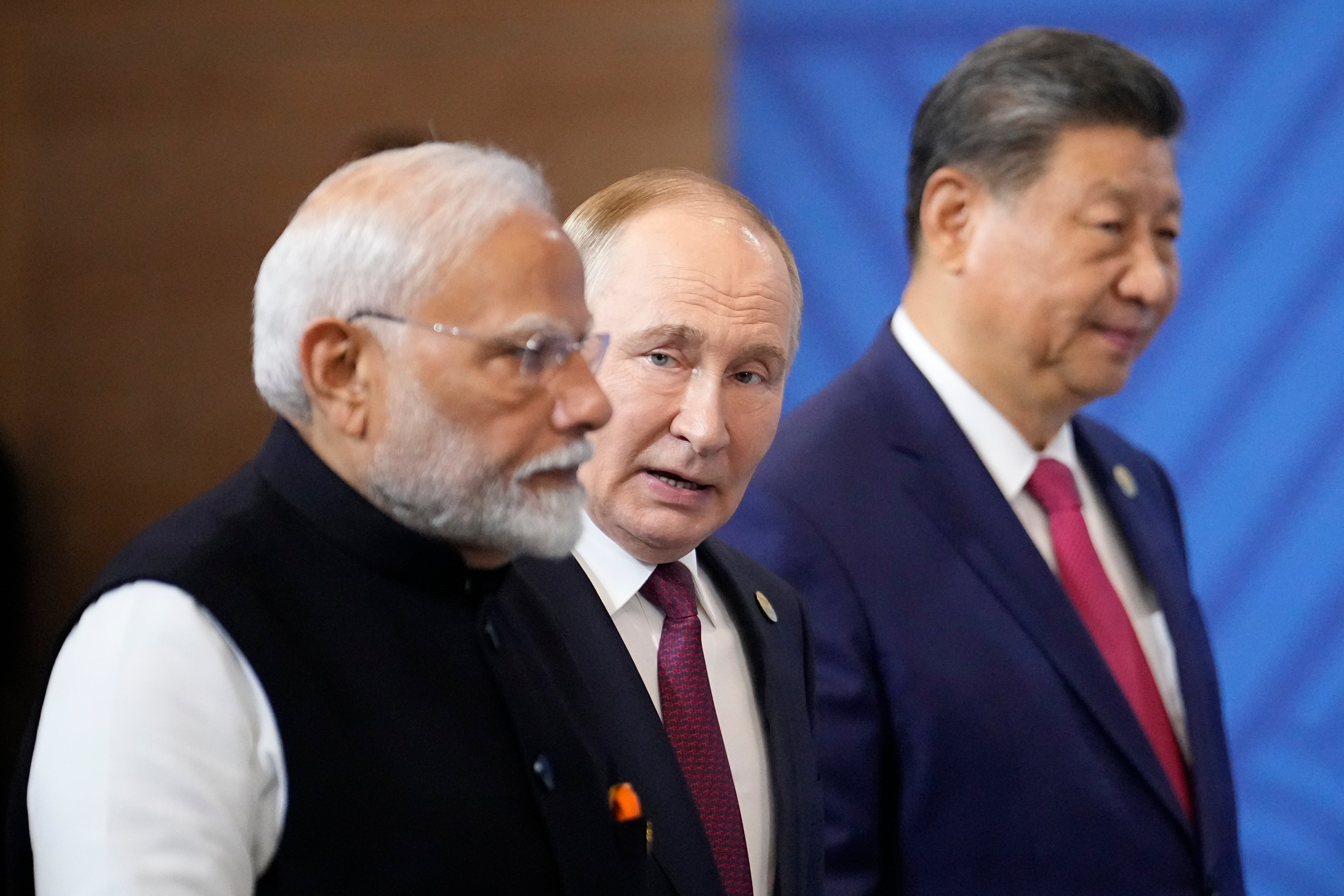Indian prime minister Narendra Modi and Chinese president Xi Jinping held their first formal meeting in five years after a violent border confrontation between the two countries threw bilateral relations into a tailspin.
The meeting, on the sidelines of the Brics summit in Russia’s Kazan, came soon after the neighbours confirmed that they had reached a deal to resolve the military standoff on their Himalayan frontier.
The meeting of leaders of the two warring parties was one of the main highlights of the Brics 2024 summit hosted by Russian leader Vladimir Putin, giving a major boost to his image on the global stage amid western efforts to isolate Russia over the Ukraine war.
Mr Xi told Mr Modi that they should enhance communication and cooperation and effectively manage differences.
“It is in the fundamental interests of the two countries and peoples for China and India to correctly grasp the trend of history and the direction of development of their relations,” Mr Xi said, according to Chinese state broadcaster CCTV.
Mr Modi called for “stable, predictable, and amicable bilateral relations” between the two world’s most populous countries, as it will have a “positive impact on regional and global peace and prosperity”.
“We welcome the agreement on the issues that had come up over the last four years,” Mr Modi told Mr Xi in comments that were aired on India’s state broadcaster Doordarshan.
Met President Xi Jinping on the sidelines of the Kazan BRICS Summit.
— Narendra Modi (@narendramodi) October 23, 2024
India-China relations are important for the people of our countries, and for regional and global peace and stability.
Mutual trust, mutual respect and mutual sensitivity will guide bilateral relations. pic.twitter.com/tXfudhAU4b
The meeting lasted for approximately 50 minutes, concluding with hand-shakes and smiles between Mr Xi and Mr Putin, who had been so far seen avoiding direct contact at such events.
It was the two leaders’ first meeting since 2019, when the Chinese president made a bilateral visit to India, before the border dispute froze such engagements.
They have only met once since, briefly and informally on the sidelines of the last Brics summit in South Africa in August 2023. In that meeting, they agreed to expeditiously deescalate tensions in the contested border areas.


The longstanding border dispute between India and China, over which they fought a war in 1962, escalated in 2020 when their troops engaged in the deadliest clash in 45 years in Ladakh region. At least 20 Indian army men and four Chinese soldiers were killed in the clash that fought with hands, stones and bludgeons as the use of guns was banned under a pact.
India announced a breakthrough in negotiations to resolve the dispute on Monday when the foreign ministry said an “agreement has been arrived at on patrolling arrangements” along the Line of Actual Control, as the loosely demarcated boundary between the countries is called.

That Mr Xi and Mr Modi are holding such a crucial meeting in Russia, which counts China and India as allies, is significant in its own right.
The meeting, and the fact he is hosting the leaders of over 20 emerging economies, is set to bolster Russian leader Vladimir Putin at a time when the West has been seeking to isolate him and his country through economic and diplomatic sanctions for waging a war on Ukraine.
The summit concluded with the signing of a 43-page final communique that ranged on topics from geopolitics and narcotics to the Ukraine war and the Middle East conflict.
The toughest language was reserved for the Middle East, calling for a ceasefire in the Gaza Strip and the West Bank, and denouncing Israeli “attacks against humanitarian operations, facilities, personnel and distribution points”.
The carefully worded declaration mentioned the Ukraine war just once, stating that “all states should act consistently with the Purposes and Principles of the UN Charter in their entirety and interrelation” and welcomed proposals for mediation through “dialogue and diplomacy”.
As many as 36 countries are attending and more than 20 of them are represented by their heads of state or government, Kremlin foreign affairs adviser Yuri Ushakov said.
The Brics summit is “the largest foreign policy event ever held” by Russia, he pointed out.
The leaders warmed up for the main event by attending a dinner and a music concert with Mr Putin.

While welcoming the Chinese leader, Mr Putin described relations between Moscow and Beijing as “one of the main stabilising factors on the world arena”. He promised to “expand coordination on all multilateral forums for the sake of global stability and a fair world order.”
Mr Xi said the “international situation is undergoing serious changes and upheavals” unseen for centuries, and commended the “unprecedented character” of China’s relations with Russia.

Mr Modi, who met Mr Putin for the second time this year, stressed the need for peace in Ukraine and said New Delhi was ready to help find a resolution to Europe’s deadliest conflict since World War Two.
“We fully support the early restoration of peace and stability. All our efforts give priority to humanity. India is ready to provide all possible support in the times to come,” he said, adding that he would discuss the issues with Mr Putin.
The two leaders shared lighthearted moments as Mr Putin joked that their “relationship is so tight that you understand me without any translation”.
This is the first summit of the Brics since its expansion last year.
Brics comprised Brazil, Russia, India, China and South Africa until last year when Iran, Egypt, Ethiopia, Saudi Arabia and the UAE joined last year.
A dozen countries, including Turkey, Azerbaijan, Pakistan and Malaysia, have formally applied to become members while several more have expressed interest in joining.
Brics now accounts for 45 per cent of the world’s population and 35 per cent of its economy, and regards itself as a political and economic counterbalance Western-led world order.
China and Russia have pushed for Brics members to reduce reliance on the US dollar as a reserve currency and instead use national currencies for trade.
Russia also wants more countries participating in a payment system project that would be an alternative to the global bank messaging network SWIFT, allowing them to trade without worrying about unilateral sanctions by the West.







